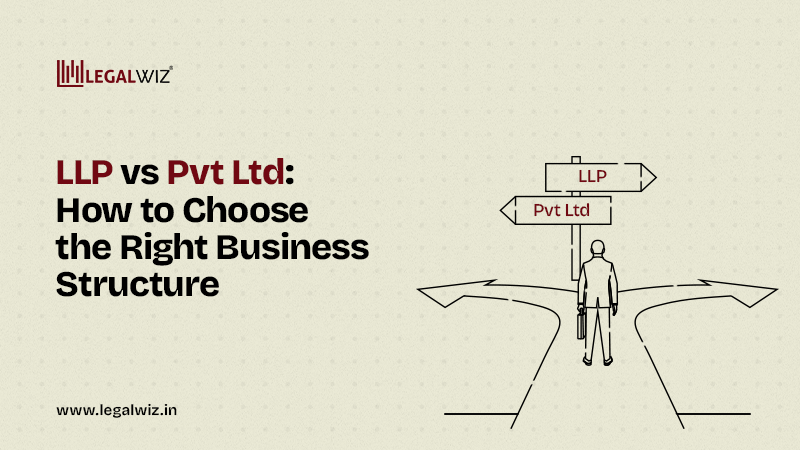LLP vs Pvt Ltd: Key Differences & How to Choose the Right Business Structure
Every year, a wave of new businesses emerges in India—over 1.85 lakh companies were registered in FY 2023-24 alone. Yet, 72% of MSMEs struggle with stagnation or decline over time. One critical misstep? Choosing the wrong business structure, which can limit growth and funding opportunities from day one
Building a business takes more than just a great idea—it starts with choosing the right legal structure that aligns with your operational needs, liability management, and funding requirements.
Among India’s most popular business structures, Private Limited Companies (Pvt Ltd) and Limited Liability Partnerships (LLP) stand out as preferred choices for MSMEs.
Choosing the right structure is crucial for long-term growth—learn more about LLP Registration and Pvt Ltd Company Registration services to get started.
While both offer limited liability protection, they differ significantly in their governance framework, ownership structure, compliance obligations, and growth potential. If you’re unfamiliar with how each structure works, check out our detailed guides on what is a Private Limited Company and all about Limited Liability Partnerships before diving into this comparison.
This comprehensive guide breaks down the key differences between Pvt Ltd and LLP—covering compliance, taxation, funding options, and operational flexibility—to help you determine the best fit for your business.
Difference Between Limited Liability Partnership (LLP) and Private Limited Company (Pvt Ltd)
The following table provides a high-level comparison of key differences between LLP and Pvt Ltd structures. Each aspect—compliance, taxation, funding, and operational flexibility—is discussed in greater detail later in this guide.
| Aspect | Private Limited Company (Pvt Ltd) | Limited Liability Partnership (LLP) |
| Governing Law | Companies Act, 2013 | Limited Liability Partnership Act, 2008 |
| Best Suited For | Startups looking for scale up, sectors like technology, manufacturing, real estate, financial services, medium to large enterprises | Professional services, consultancy firms, small businesses |
| Ownership & Management | Shareholders own the company, while directors manage operations. | Owned and managed by designated partners & partners as per the LLP Agreement. Decision-making is collaborative. |
| Minimum & Maximum Members | Minimum: 2 shareholders Maximum: 200 shareholders | Minimum: 2 partners No upper limit on the number of partners |
| Capital Requirement | No mandatory minimum paid-up capital, but an authorized capital of ₹1,00,000 must be maintained. | No minimum capital requirement, but an initial capital of ₹10,000 is advisable |
| Taxation | Corporate tax rate of 25% (excluding surcharge & cess) Dividends are taxable in the hands of shareholders at their applicable slab rate, with a 10% TDS if the dividend exceeds ₹10,000. | LLPs are taxed at a fixed rate of 30% on earnings. Profits distributed to partners are not subject to additional tax. |
| Investment & Funding | Can issue equity shares or other class of securities, making it easy to attract investors (VCs, private equity, etc.). | Cannot issue shares; funding is limited to partner contributions and debt financing. |
| Ownership Transferability | Shares can be transferred easily as governed in the Articles of Association (AoA) of the company | Transfer of partnership rights is complex and often requires partner approval through a supplementary agreement |
| ESOPs (Employee Stock Option Plans) | Can issue ESOPs to employees | Cannot issue ESOPs |
| Governing Documents | Memorandum of Association (MOA) & Articles of Association (AOA) | LLP Agreement defines roles, duties, and governance |
| Compliance Requirements | · Higher compliance costs · Mandatory board meetings · Statutory audits required · Annual filings: AOC-4 (financials) & MGT-7 (returns) | · Lower compliance costs · No mandatory board meetings · Statutory audits required only if turnover exceeds ₹40 lakh or capital contribution exceeds ₹25 lakh · Annual filings: Form 8 (financials) & Form 11 (returns) |
| Registration Process | Registered through the SPICe+ (Simplified Proforma for Incorporating a Company Electronically) form | Registered through the FiLLiP (Form for Incorporation of LLP) form |
| Name Reservation | Reserved via SPICe+ Part A | Reserved via LLP-RUN |
| Dissolution Process | More complex; initiated by filing Form STK-2 | Simpler process; initiated by filing Form 24 |
Similarities between LLP and Pvt Ltd
Despite their differences, LLPs and Pvt Ltd companies share several key characteristics:
- Limited Liability Protection: Owners and partners are only liable for their capital investment, safeguarding personal assets.
- Separate Legal Identity: Both entities exist independently of their founders.
- MCA Registration: Both must be registered with the Ministry of Corporate Affairs (MCA).
- Perpetual Succession: The business continues even if ownership changes.
This is a high-level comparison to help you understand the key differences between a Private Limited Company (Pvt Ltd) and a Limited Liability Partnership (LLP). By recognizing these distinctions, entrepreneurs can make an informed choice that aligns with their business goals and long-term vision. For a more in-depth breakdown of each business structure, explore the detailed comparisons outlined below.
LLP vs Pvt Ltd: A Comparative Analysis of Key Business Factors
Registration Process: Setting Up an LLP vs Private Limited Company
Starting a business requires careful attention to registration procedures. Understanding the step-by-step process, timelines, and documentation requirements for both LLP and Private Limited Company registration will help you plan your business launch effectively. Here’s a detailed comparison of how to register each business structure in India.
| Step | Private Limited Company (Pvt Ltd) | Limited Liability Partnership (LLP) |
| 1. Obtain DSC | Required for directors & shareholders to sign electronic documents. | Required for all designated partners |
| 2. Name Reservation | Apply through SPICe+ Part A, submitting two name options for approval. | Apply through LLP-RUN Form via MCA for name approval. |
| 3. Business Incorporation & Agreement Filing | Apply for Certificate of Incorporation using SPICe+ Part B, which includes allotment of DIN, PAN, TAN, EPFO, and ESIC registrations. | Apply for Certificate of Incorporation using FiLLiP Form, including partner consent, and file Form 3 on the MCA portal to define roles and responsibilities of partners. |
| 4. Open Business Bank Account | Mandatory and must be selected from the list provided in the SPICe form. | Mandatory |
| 5. File Commencement of Business Certificate | File INC-20A within 180 days of incorporation to declare business commencement. | Not required for LLPs. |
Compliance and Regulatory Framework: Private Limited Company vs LLP
Meeting regulatory requirements is crucial for maintaining your business’s legal status. This section outlines the ongoing compliance obligations for both structures, helping you understand the time, effort, and resources needed to keep your business compliant with Indian law.
| Requirement | Private Limited Company (Pvt Ltd) | Limited Liability Partnership (LLP) |
| Board Meetings | Must hold at least four board meetings per year. Small Companies (as per Section 2(85)) and OPCs must hold at least one Board Meeting in each half of the calendar year, with a minimum gap of 90 days between two meetings. | Not required. |
| Annual General Meeting (AGM) | First AGM should be conducted within 9 months from the end of the first financial year. Subsequent AGMs should be conducted within 6 months from the end of the financial year. | Not required. |
| Statutory Audit | Compulsory for all Pvt Ltd companies, regardless of turnover. | Required only if turnover exceeds ₹40 lakh or capital contribution exceeds ₹25 lakh. |
| Key Filings & Compliance Requirements | · Annual Filings: AOC-4 (Financial Statements) & MGT-7 (Annual Return) must be filed annually. · Director KYC: DIR-3 KYC must be filed annually to update details of all DIN holders, including directors and designated partners. with the MCA | · Annual Filings: Form 11 (Annual Return) & Form 8 (Statement of Accounts and Solvency) must be filed annually. · Director KYC: DIR-3 KYC must be filed annually to update directors and designated partners detail with the MCA. |
Funding and Investment Options: LLP vs PVT LTD
Your choice of business structure significantly impacts your ability to raise capital and attract investors. Learn how LLPs and Private Limited Companies differ in their funding capabilities, from equity financing to debt options, helping you align your business structure with your growth ambitions.
| Aspect | Private Limited Company | Limited Liability Partnership |
| Equity Financing | Can raise funds by issuing shares, attracting venture capital and private equity. | Cannot issue shares, limiting external investment options. |
| Debt Financing | Eligible for bank loans, debentures, and convertible notes. | Can avail business loans but with fewer options. |
| Foreign Direct Investment (FDI) | 100% FDI is allowed in most sectors under automatic route. | Same as PLC |
Taxation: Pvt Ltd vs LLP
While both business structures offer limited liability protection, their tax implications differ significantly, affecting your bottom line and financial planning:
| Aspect | Private Limited Company | Limited Liability Partnership |
| Corporate Tax Rate | · 25% if turnover is ≤ ₹400 Cr in the previous year. · 30% if turnover is > ₹400 Cr in the previous year. · Optional new tax rates: 22% for existing companies & 15% for new companies engaged in manufacturing businesses (with no exemptions/deductions). | · Fixed 30% tax rate on total income. |
| Surcharge | · 7% on income > ₹1 Cr & ≤ ₹10 Cr. · 12% on income > ₹10 Cr. · 10% on income (irrespective of any limit in case of optional new tax rates) | · 12% on income > ₹1 Cr. |
| Cess | 4% Health & Education Cess applies to tax + surcharge. | 4% Health & Education Cess applies to tax + surcharge. |
| Effective Tax Rate | · 26.0% if turnover is ≤ ₹400 Cr in the previous year and income is ≤ ₹1 Cr · 27.8% if turnover is ≤ ₹400 Cr in the previous year and income is > ₹1 Cr & ≤ ₹10 Cr. · 29.1% if turnover is ≤ ₹400 Cr in the previous year and income is > ₹10 Cr. · 31.2% if turnover is ≤ ₹400 Cr in the previous year and income is ≤ ₹1 Cr · 33.3% if turnover is > ₹400 Cr in the previous year and income is > ₹1 Cr & ≤ ₹10 Cr. · 34.9% if turnover is > ₹400 Cr in the previous year and income is > ₹10 Cr. · 22.1% for existing companies with optional tax rate · 17.1% for new companies engaged in manufacturing business with optional tax rate | · 31.2% if total income is ≤ ₹1 Cr. · 34.9% if total income is > ₹1 Cr. |
| Dividend Distribution Tax | No Dividend Distribution Tax (DDT); dividends are taxed in shareholders’ hands as per their income slab. | Not applicable (LLPs do not issue dividends). |
Running Your Business: Pvt Ltd vs LLP in Day-to-Day Operations
Beyond legal and financial considerations, your business structure affects daily operations, decision-making, and management flexibility. This comparison reveals how each structure impacts your business’s operational efficiency and management style.
| Operational Aspect | Private Limited Company (Pvt Ltd) | Limited Liability Partnership (LLP) |
| Decision-Making Process | · Board resolutions are required for major decisions. · Shareholder voting for key matters. Structured corporate governance may slow down decision-making | · Flexible, partner-driven decisions. · Quick execution possible. · Decisions as per the LLP Agreement, which may require consensus. |
| Document Management | · Detailed record-keeping required. · MOA & AOA compliance must be maintained. · Board meeting minutes mandatory. | · Simpler documentation. · LLP Agreement must be updated for structural changes. · Basic record-keeping required. |
| Business Scalability | · Easy to add new shareholders. · Multiple share classes possible. · Clear valuation mechanisms. · Easier to attract institutional investors. | · Growth limited by partner dynamics. · Profit-sharing modifications require consensus. · No shareholding structure limits equity-based growth. |
| Financial Operations | · Separate bank accounts mandatory. · Structured financial reporting. · Mandatory audits, even with low turnover. | · Separate bank accounts from their owners mandatory. · Flexible financial management. · Audit required only if turnover exceeds ₹40 lakh or contribution exceeds ₹25 lakh. |
| Exit Options | · Shares can be transferred, enabling investor exits. · Share buyback and public listing possible. | · Partner retirement or exit depends on the LLP Agreement. · Transfer of ownership is complex and usually requires mutual consent. |
| Market Perception | · More credibility with banks and investors. · Preferred by large clients and corporations. · Better vendor terms. | · Good for professional services and small businesses. · Perceived as a small business or professional firm structure. |
| Growth Flexibility | · Can expand through subsidiaries. · Multiple business verticals possible. · Eligible for mergers, acquisitions, and external funding. · International expansion is easier. | · Limited to partnership model. · Branch expansion possible. · Expansion mostly through retained earnings or partner contributions. · Can expand internationally with streamlined compliance processes and fewer regulatory hurdles |
| Asset Management | · Clear corporate ownership structure. · Company can hold property and intellectual assets. · Easier to use assets as collateral for loans. | · LLPs have a separate legal identity and can own property. · Can hold intellectual assets similar to Pvt Ltd. · Assets can be used as collateral for loans. |
Making the Right Choice: LLP vs Private Limited Company
The choice between an LLP and a Private Limited Company should align with your business’s growth plans, operational needs, and funding strategy. Here’s a quick guide to help you decide:
Choose a Private Limited Company if:
- You’re building a scalable startup with plans to raise venture capital.
- Your business requires significant external investment.
- You want to offer ESOPs (equity-based compensation) to attract top talent.
- You operate in a regulated industry or plan to work with large corporations.
- You anticipate going public (IPO) in the future.
Choose an LLP if:
- You run a professional services firm (consulting, legal, accounting).
- Your business is self-funded with steady cash flow.
- You prefer operational flexibility with minimal compliance burden.
- Your business involves frequent profit-sharing adjustments among partners.
- You want to maintain a smaller, controlled ownership structure.
Key Considerations Before You Decide:
- An LLP is not ideal for businesses seeking venture capital or external funding.
- A Pvt Ltd company requires higher compliance and ongoing regulatory filings.
- Ownership transfer in an LLP can be restrictive, making exits harder.
- A Pvt Ltd structure comes with higher setup and maintenance costs, so ensure you can manage them.
Your choice isn’t just a legal formality—it’s a strategic decision that shapes your business’s long-term growth, funding potential, and credibility. The key is to think beyond your immediate needs and consider your five-year business plan. A Pvt Ltd company offers more structure and funding flexibility, while an LLP provides operational ease with fewer compliance requirements.
Navigate Your Business Journey with LegalWiz.in
Choosing the right business structure is just the beginning. Ensuring seamless registration and compliance can help your business scale faster.
At LegalWiz.in, we provide:
- End-to-End Registration Support – From DSC application to final certificate, we handle every step with precision
- Transparent Pricing – No hidden charges, just straightforward, affordable services
- Compliance Assistance – Annual filings, KYC updates, and tax compliance handled with ease
- Expert Guidance – Personalized recommendations based on your industry, funding goals, and growth plans
Whether you’re launching a startup or restructuring an existing business, LegalWiz.in ensures your foundation is legally sound and growth-ready.
Ready to Register Your Business? Schedule a Free Consultation
Frequently Asked Questions
Is an LLP required to have board meetings like a Private Limited Company?
No, an LLP does not require board meetings. A Private Limited Company, however, must hold at least four board meetings per year, including one within the first 30 days of incorporation. Learn more about the compliance requirements for Pvt Ltd and LLP compliance.
Can an LLP be converted into a Private Limited Company?
Yes, an LLP can be converted into a Private Limited Company under Section 366 of the Companies Act, 2013. The process involves securing partner consent, filing a conversion application, and obtaining a new Certificate of Incorporation from the MCA. Read the step-by-step guide on converting LLP to Pvt Ltd.
Which structure has a lower tax burden: LLP or Pvt Ltd?
LLPs are taxed at a flat 30% rate with a 12% surcharge on income above ₹1 crore. Pvt Ltd companies pay 25% tax if turnover is below ₹400 crore and 30% if above. Companies can also opt for the new tax regime (22% for existing and 15% for new companies) but must forgo certain exemptions.
Can LLPs raise funding like Private Limited Companies?
No, LLPs cannot issue shares, making it difficult to attract venture capital (VC) or private equity (PE) investors. Private Limited Companies, however, can raise funds through equity investments, ESOPs, and IPOs.
Does an LLP have perpetual succession like a Private Limited Company?
Yes, both LLPs and Private Limited Companies have perpetual succession, meaning the business continues even if partners or shareholders change. However, LLP dissolution is simpler, while Pvt Ltd closure requires additional regulatory steps. Understand more about LLP dissolution and Pvt Ltd company closure
What are the compliance requirements for LLP vs Pvt Ltd?
A Private Limited Company has higher compliance obligations, including annual filings (AOC-4 & MGT-7), board meetings, and mandatory audits. An LLP has fewer requirements—Form 8 (Statement of Accounts) and Form 11 (Annual Return) must be filed annually, and audits are required only if turnover exceeds ₹40 lakh or capital contribution exceeds ₹25 lakh.
Can an LLP issue ESOPs (Employee Stock Option Plans) like a Private Limited Company?
No, LLPs cannot issue ESOPs because they do not have a shareholding structure. Pvt Ltd companies can offer ESOPs to employees to attract and retain top talent. Learn how ESOPs work for Private Limited Companies.
What is the difference between shareholders and partners in these structures?
- Shareholders (Pvt Ltd): Own shares in the company but may not manage daily operations.
- Partners (LLP): Own and directly manage the business as per the LLP Agreement.
How long does it take to register an LLP vs a Private Limited Company?
- Private Limited Company: 10-15 days (requires DSC, DIN, MOA, AOA, and filing via SPICe+) subject to MCA approval.
- LLP: 15-18 days (requires DSC, LLP Agreement, and filing via FiLLiP form) subject to MCA approval.
Is it easier to exit from a Pvt Ltd company or an LLP?
A Private Limited Company allows shareholders to sell or transfer shares, making exits easier. In contrast, an LLP requires partner consent for exits, making the process more restrictive.
Can ownership in an LLP be transferred like shares in a Private Limited Company?
No, LLP ownership transfer is complex and requires an amendment to the LLP agreement. Pvt Ltd shares can be freely transferred, making investor exits simpler.
Which business structure is more credible for banks and investors?
Private Limited Companies have higher credibility with banks, investors, and large corporations due to their structured governance and shareholding flexibility. LLPs are more suited for professional services and smaller businesses.
Is an LLP better for a small business or professional services firm?
Yes, LLPs are ideal for consulting, legal, or CA firms, as they offer limited liability with fewer compliance requirements. However, scalability is limited compared to a Private Limited Company.
What are the key documents required for LLP and Private Limited Company registration?
● Pvt Ltd: Identity and address proof of shareholders and directors, along with registered office address proof.
● LLP: Identity and address proof of partners, LLP Agreement, and registered office address proof.
Which business structure has a simpler registration process?
LLP and Private Limited Company registrations have distinct steps to follow, but both take almost the same time for completion. While LLP registration involves fewer compliance requirements, a Private Limited Company requires more documentation and approvals. However, the overall registration duration for both structures is comparable.
Can an LLP be publicly listed like a Private Limited Company?
No, LLPs cannot be listed on stock exchanges, while Private Limited Companies can transition into Public Limited Companies and launch an IPO. Learn how a Pvt Ltd company can go public.

Amisha Shah
Amisha Shah heads content at LegalWiz.in, where she transforms complex legal concepts into clear, actionable insights. With extensive experience in legal, fintech, and business services, she helps startups and enterprises navigate regulatory challenges through engaging, accurate content that empowers informed business decisions.







